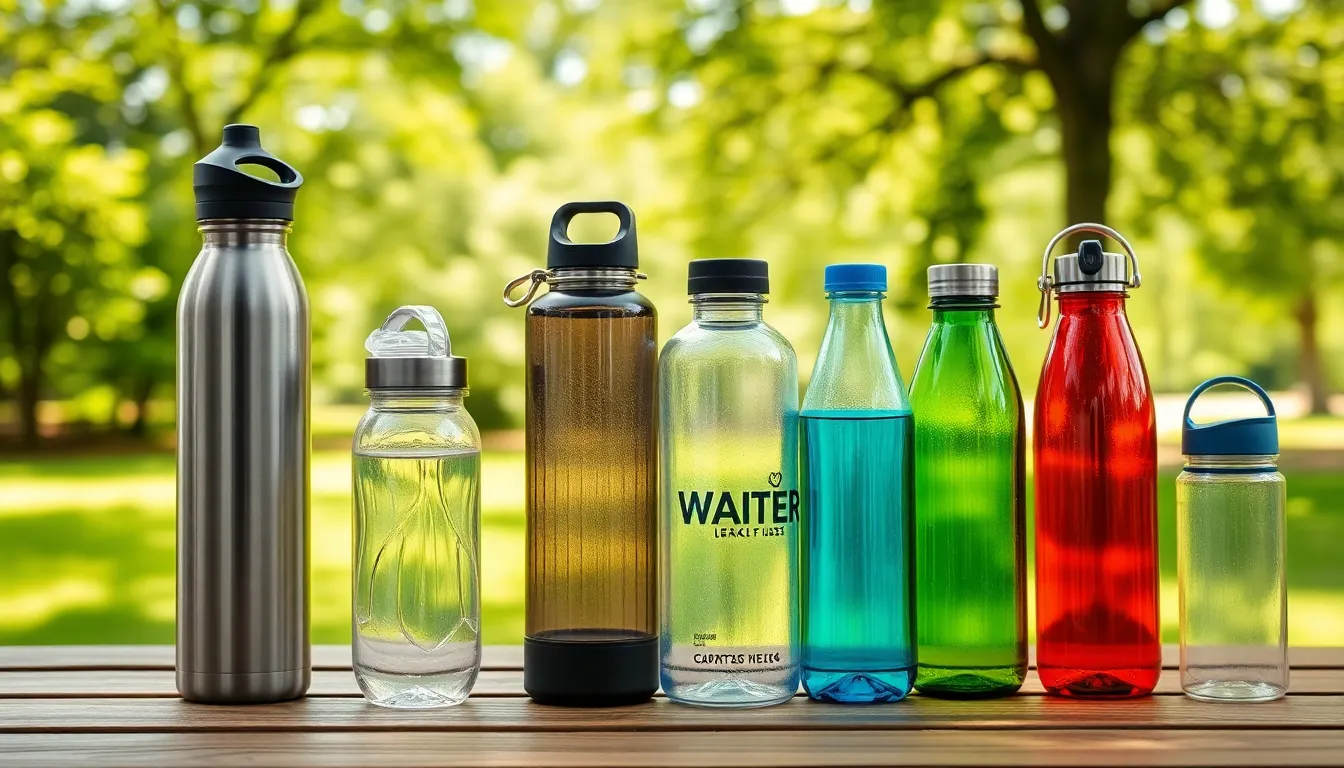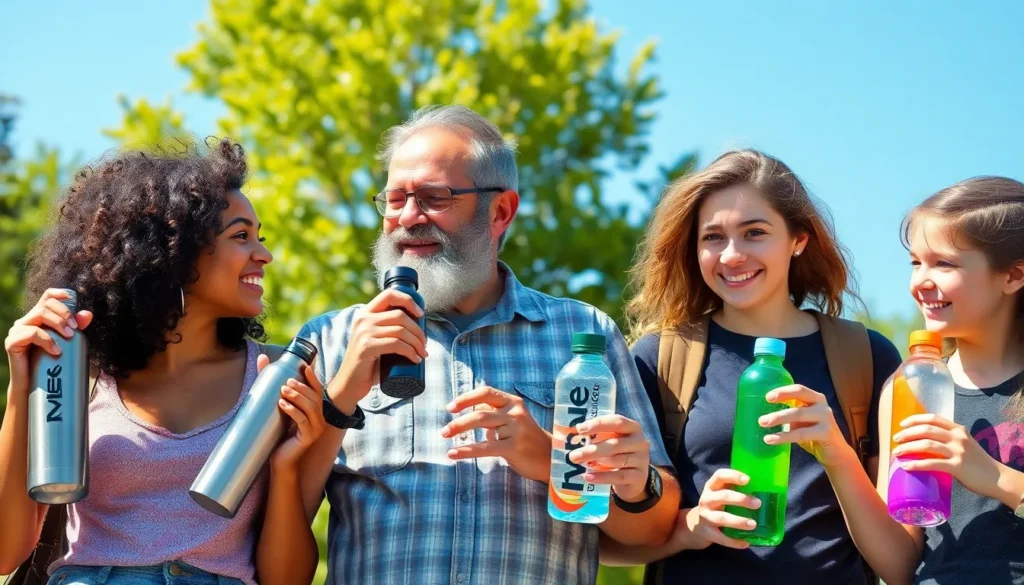Table of Contents
ToggleIn a world increasingly aware of environmental issues, reusable water bottles have emerged as a simple yet powerful solution. These eco-friendly alternatives not only reduce plastic waste but also promote healthier hydration habits. With countless styles and materials available, choosing the right reusable bottle can enhance both lifestyle and sustainability.
As people seek to minimize their carbon footprint, the benefits of reusable water bottles extend beyond just environmental impact. They offer convenience for on-the-go hydration, cost savings over time, and the ability to personalize one’s drinking experience. This article explores the various types of reusable water bottles, their advantages, and tips for making the best choice.
Overview of Reusable Water Bottles
Reusable water bottles are designed to lessen the environmental impact of single-use plastic bottles. They provide a sustainable option for hydration while encouraging healthier drinking habits.
Benefits of Reusable Water Bottles
- Environmental Impact
Reducing plastic waste significantly contributes to lowering pollution levels. By using reusable bottles, individuals help decrease the number of plastic bottles ending up in landfills and oceans.
- Cost Savings
Using reusable water bottles leads to substantial savings over time. The average person spends around $1,400 annually on bottled water. Choosing a refillable bottle cuts this cost dramatically.
- Healthier Hydration
Reusable bottles often contain BPA-free materials, ensuring safer hydration. They also avoid the risk of chemicals leaching into the water, as seen in some disposable plastics.
- Variety and Personalization
A wide range of materials and designs are available, including stainless steel, glass, and BPA-free plastic. Customization options, such as colors and prints, allow individuals to express their style.
Types of Reusable Water Bottles
- Stainless Steel Bottles
Stainless steel offers durability and insulation. They keep beverages cold for hours and resist rust and corrosion.
- Glass Bottles
Glass provides a non-toxic drinking option and doesn’t retain flavors or odors. Protective sleeves enhance their durability.
- Plastic Bottles
BPA-free plastic bottles are lightweight and often come in a variety of colors and designs. Many are designed for easy carrying.
- Collapsible Bottles
Collapsible options save space when not in use. They’re ideal for travel and outdoor activities.
Tips for Selecting a Reusable Water Bottle
- Material Consideration
Choose a material that fits lifestyle needs, such as weight or insulation properties.
- Size Selection
Opt for a size that meets daily hydration needs. Common sizes include 16 oz, 24 oz, and 32 oz.
- Ease of Cleaning
Look for bottles that are dishwasher safe or have wide openings for easy cleaning.
- Cap Features
Different caps offer functionality; screw caps, flip tops, or straws serve various purposes.
- Design Preferences
Select designs that reflect personal style. Consider colors, patterns, and shapes.
This overview emphasizes the importance of reusable water bottles and their role in sustainable living.
Types of Reusable Water Bottles

Various types of reusable water bottles cater to diverse preferences and needs. Each type offers distinct advantages that contribute to healthier hydration and environmentally friendly practices.
Stainless Steel
Stainless steel water bottles provide excellent insulation, keeping beverages hot or cold for extended periods. These bottles are durable, resistant to dents, and often come with a powder-coated or matte finish. Many stainless steel options feature BPA-free lids and are easy to clean. Brands like Hydro Flask and Klean Kanteen showcase popular stainless steel designs.
Plastic
BPA-free plastic water bottles are lightweight and available in numerous colors and designs. These bottles are budget-friendly, making them a popular choice for casual users. They often feature built-in straws or spouts for easy sipping. However, plastic bottles may retain odors and flavors over time, which could affect taste. Notable examples include Nalgene and CamelBak.
Glass
Glass water bottles offer a clean taste, free from chemical leaching. They are typically heavier than plastic and can break easily if dropped. Many glass options include silicone sleeves for added protection. Glass bottles maintain temperature but may lack the insulation of stainless steel. Popular brands like Takeya and Lifefactory emphasize stylish and functional designs in glass.
Benefits of Using Reusable Water Bottles
Reusable water bottles offer significant advantages, impacting both the environment and personal health. These advantages promote sustainability and encourage healthier lifestyle choices.
Environmental Impact
Reusable water bottles significantly reduce plastic waste. Single-use plastic bottles contribute to pollution, with millions ending up in landfills and oceans each year. By choosing reusable options, individuals help decrease the demand for new plastic production. Studies indicate that switching to reusable bottles can cut down plastic waste by an estimated 167 plastic bottles per person annually. Furthermore, many brands use recycled materials or sustainable manufacturing processes, further enhancing their eco-friendliness. This shift leads to lower carbon emissions linked to both production and disposal of plastic bottles.
Health Considerations
Using reusable water bottles can improve hydration while minimizing health risks. Many reusable bottles are made from BPA-free materials, which eliminate concerns associated with harmful chemical leaching found in some single-use plastics. Regular usage facilitates increased water intake, contributing to better overall health. Additionally, some bottles come equipped with features like built-in filters or high-quality insulation, ensuring that water remains clean and at the desired temperature. These health benefits underscore the practical advantages of incorporating reusable bottles into daily life.
Choosing the Right Reusable Water Bottle
Selecting an appropriate reusable water bottle requires consideration of several factors. Understanding size and capacity, along with design and features, makes it easier for consumers to find the ideal fit for their needs.
Size and Capacity
Size and capacity play crucial roles in choosing a reusable water bottle. Most bottles range from 12 ounces to 64 ounces, catering to different hydration needs. Smaller sizes, around 12 to 20 ounces, suit children or individuals who prefer lighter options. Medium sizes, typically 24 to 32 ounces, fit those seeking a balance between weight and capacity. Larger bottles, from 40 to 64 ounces, benefit active individuals engaging in prolonged outdoor activities or workouts. It’s essential to assess daily hydration goals and activity levels when selecting size, ensuring it meets personal needs without compromising portability.
Design and Features
Design and features contribute significantly to the overall functionality of a reusable water bottle. Considerations include materials, lid types, and usability features. Bottles often come in stainless steel, glass, or BPA-free plastic, each affecting weight, insulation, and durability. Various lid options, like wide-mouth openings or straws, enhance convenience for different situations, such as sipping during exercise or filling up quickly. Additionally, features such as built-in filters, insulation for temperature retention, or customize prints provide further personalization. Assessing designs and features ensures compatibility with intended uses, enhancing satisfaction with the chosen bottle.
Embracing reusable water bottles is a simple yet impactful step toward a sustainable lifestyle. By choosing these eco-friendly alternatives, individuals can significantly reduce plastic waste while enjoying the benefits of healthier hydration. The variety of options available ensures that everyone can find a bottle that suits their needs and preferences.
As more people make the switch to reusable bottles, the collective impact on the environment becomes increasingly significant. Not only do these bottles promote personal health, but they also contribute to a cleaner planet for future generations. Investing in a reusable water bottle is not just a personal choice; it’s a commitment to a more sustainable future.







